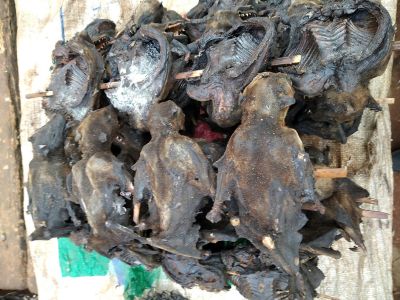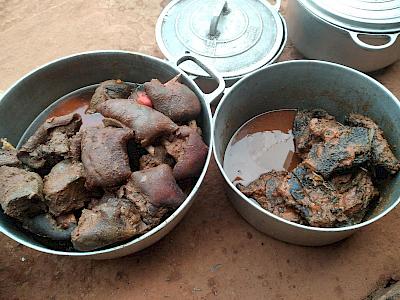
A One Health Approach to bushmeat consumption in Cameroon
In Cameroon, bushmeat is not just a food choice but a culturally significant tradition. This report explores how to balance this practice with global health priorities, striving for a wild meat trade that is safe, sustainable, and legal.
key findings
Cameroon is a land of breathtaking biodiversity, home to some of the world’s most iconic and threatened species including chimpanzees, elephants, and gorillas. This rich natural heritage coexists with a deep-rooted tradition of eating bushmeat, where animals such as bats, antelopes, and monkeys are commonly sold in food markets.
While bushmeat remains a crucial food source for many rural communities in Cameroon and Central Africa, unsustainable and illegal hunting practices are taking a heavy toll on wildlife populations jeopardising species conservation, threatening food security, and potentially affecting human health, with potential risks of zoonotic diseases—(those that can transfer from animals to humans).

Photo: Offono / TRAFFIC
The COVID-19 pandemic brought increased global attention to these risks, emphasising the need to understand further how bushmeat trade can contribute to disease emergence and spread.
This study, focusing on the markets and sales outlets in Bertoua (East Region) and Douala (Littoral Region), analysed the bushmeat supply chain from hunting grounds to market stalls, identifying critical control points to reduce risks of zoonotic disease emergence and spread.
The research also assessed risks related to wildlife conservation, public health, and legal compliance in Cameroon and evaluated key indicators from the Central African Bushmeat Monitoring System (SYVBAC), which was established to oversee the bushmeat sector. SYVBAC has faced implementation challenges and initially, focused on only a single health indicator for zoonotic disease risks.
To address evolving needs, TRAFFIC, in collaboration with the Central African Forestry Commission (COMIFAC), has supported the expansion of these indicators. This expansion is part of a broader initiative to enhance the regional One Health approach, which recognises the interconnectedness of human, animal, and environmental health.

Photo: Offono / TRAFFIC
Findings indicate that zoonotic disease transmission risks are moderate to very high throughout the bushmeat value chain, from hunting and transport to market sales. Contributing factors include inadequate biosecurity, legislative gaps, and risky human behaviours.
Alarmingly, over half of those interviewed in Bertoua and Douala did not believe bushmeat carries risk of disease, highlighting the need for improved risk communication and community engagement.
The report recommends developing systems for disease prevention, surveillance, and response along the bushmeat supply chain. It also emphasises integrating SYVBAC with existing surveillance systems.
Key actions include establishing a zoonotic disease alert system, strengthening market controls, and supporting local authorities in creating safer environments for bushmeat sales. With support from TRAFFIC’s Wildlife-TRAPS and ReTTA teams, the Cameroon government has swiftly developed and validated Standard Operating Procedures and training modules, training 23 field inspectors from six regions on veterinary health inspections of bushmeat in markets and along the value chain.
Released in conjunction with the 8th World One Health Congress (WOHC) in Cape Town, South Africa, this report complements TRAFFIC’s ‘From Bush to Butchery‘ findings in Tanzania, which will be presented at the WOHC. The WOHC brings together global experts—including researchers, policymakers, and representatives from international institutions—to discuss One Health solutions for wildlife management, trade, and the health risks associated with consuming wild meat.

More informations : TRAFFIC, 2024




